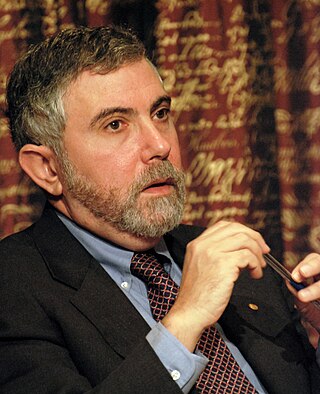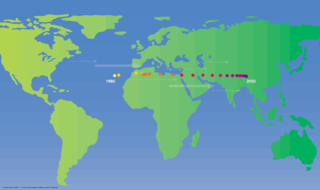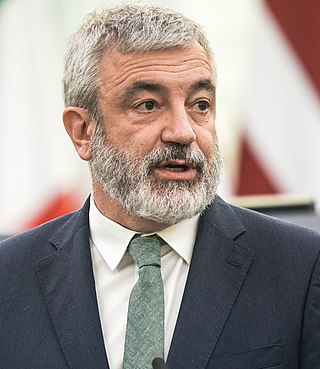Related Research Articles
Comparative advantage in an economic model is the advantage over others in producing a particular good. A good can be produced at a lower relative opportunity cost or autarky price, i.e. at a lower relative marginal cost prior to trade. Comparative advantage describes the economic reality of the work gains from trade for individuals, firms, or nations, which arise from differences in their factor endowments or technological progress.

Robert Cox Merton is an American economist, Nobel Memorial Prize in Economic Sciences laureate, and professor at the MIT Sloan School of Management, known for his pioneering contributions to continuous-time finance, especially the first continuous-time option pricing model, the Black–Scholes–Merton model. In 1997 Merton together with Myron Scholes were awarded the Bank of Sweden Prize in Economic Sciences in Memory of Alfred Nobel for the method to determine the value of derivatives.
Development economics is a branch of economics that deals with economic aspects of the development process in low- and middle- income countries. Its focus is not only on methods of promoting economic development, economic growth and structural change but also on improving the potential for the mass of the population, for example, through health, education and workplace conditions, whether through public or private channels.

Paul Robin Krugman is an American economist who is the Distinguished Professor of Economics at the Graduate Center of the City University of New York and a columnist for The New York Times. In 2008, Krugman was the sole winner of the Nobel Memorial Prize in Economic Sciences for his contributions to new trade theory and new economic geography. The Prize Committee cited Krugman's work explaining the patterns of international trade and the geographic distribution of economic activity, by examining the effects of economies of scale and of consumer preferences for diverse goods and services.

A country's gross government debt is the financial liabilities of the government sector. Changes in government debt over time reflect primarily borrowing due to past government deficits. A deficit occurs when a government's expenditures exceed revenues. Government debt may be owed to domestic residents, as well as to foreign residents. If owed to foreign residents, that quantity is included in the country's external debt.
New trade theory (NTT) is a collection of economic models in international trade theory which focuses on the role of increasing returns to scale and network effects, which were originally developed in the late 1970s and early 1980s. The main motivation for the development of NTT was that, contrary to what traditional trade models would suggest, the majority of the world trade takes place between countries that are similar in terms of development, structure, and factor endowments.

The Latin American debt crisis was a financial crisis that originated in the early 1980s, often known as La Década Perdida, when Latin American countries reached a point where their foreign debt exceeded their earning power, and they could not repay it.

The gravity model of international trade in international economics is a model that, in its traditional form, predicts bilateral trade flows based on the economic sizes and distance between two units. Research shows that there is "overwhelming evidence that trade tends to fall with distance."
The Frisch Medal is an award in economics given by the Econometric Society. It is awarded every two years for empirical or theoretical applied research published in Econometrica during the previous five years. The award was named in honor of Ragnar Frisch, first co-recipient of the Nobel prize in economics and editor of Econometrica from 1933 to 1954. In the opinion of Rich Jensen, Gilbert F. Schaefer Professor of Economics and chairperson of the Department of Economics of the University of Notre Dame, "The Frisch medal is not only one of the top three prizes in the field of economics, but also the most prestigious 'best article' award in the profession". Five Frisch medal winners have also won the Nobel Prize.

Fabrizio Zilibotti is an Italian economist. He is the Tuntex Professor of International and Development Economics at Yale University. Zilibotti was previously professor of economics at University College London, the University of Zürich, and at the Institute for International Economic Studies in Stockholm.
Michael Paul Todaro is an American economist and a pioneer in the field of development economics.
Richard Andreas Werner is a German banking and development economist who is a university professor at University of Winchester.

Luis Garicano Gabilondo is a Spanish economist and politician who was a Member of the European Parliament (MEP) from 2019 to 2022. He was also vice president of Renew Europe and vice president of the European political party Alliance of Liberals and Democrats for Europe. Before entering politics, he was a professor of strategy and economics at IE Business School in Madrid and at the London School of Economics (LSE). After leaving the European Parliament he has returned to academia as a visiting professor at Columbia Business School and at the University of Chicago Booth School of Business. An overview of his work can be found here.
International trade theory is a sub-field of economics which analyzes the patterns of international trade, its origins, and its welfare implications. International trade policy has been highly controversial since the 18th century. International trade theory and economics itself have developed as means to evaluate the effects of trade policies.
Zvi Eckstein is a full professor, dean, Arison School of Business and Tiomkin School of Economics at The Interdisciplinary Center Herzliya - IDC. Emeritus Professor at the Eitan Berglas School of Economics, Tel Aviv University. Head, the Aaron Economic Policy Institute, IDC, Herzliya. University of Pennsylvania, the Wharton School, Finance Department, Judith C. and William G. Bollinger Visiting Professor. Served as deputy governor, Bank of Israel (2006-2011). The Walras-Bowely Lecturer, the Econometric Society, North America Summer Meetings, Pittsburgh, US, June 19, 2008. Fellow of the Econometric Society.
Pinelopi "Penny" Koujianou Goldberg is a Greek-American economist who served as chief economist of the World Bank from 2018 until 2020. She holds the named chair of Elihu Professor of Economics at Yale University. She is also a non-resident senior fellow at the Peterson Institute for International Economics.
Francis Kramarz is a French economist who works as Professor at the École Nationale de la Statistique et de l'Administration Économique (ENSAE), where he has been directing the Center for Research in Economics and Statistics (CREST). He is one of the leading labour economists in France.
Enrica Detragiache is the head of the Germany Desk of the International Monetary Fund (IMF), and the assistant director of the IMF's European division. She formerly taught Economics at Johns Hopkins University, and has published over 70 research papers and articles. Her research covers topics such as labour migration, financial crises, development economics, and corporate finance.
Raquel Fernández is an economist and currently the Julius Silver, Roslyn S. Silver and Enid Silver Winslow Professor of Economics at New York University. She is also a fellow of the Econometric Society.
Samuel S. Kortum is an American economist and currently James Burrows Moffatt Professor of Economics at Yale University. His research focuses on international trade and industrial organisation.
References
- ↑ "Jonathan Eaton". psu.edu. Retrieved April 14, 2017.
- ↑ "Jonathan Eaton" . Retrieved April 14, 2017.
- ↑ "Newly Elected Fellows". amacad.org. Retrieved April 14, 2017.
- ↑ "MyCV – Department of Economics".
- ↑ "Eatonjonathanecon". EatonJonathanEcon. Retrieved 22 April 2019.
- ↑ Eaton, Jonathan; Eckstein, Zvi (1994). "Cities and Growth: Theory and Evidence from France and Japan". doi: 10.3386/w4612 .
{{cite journal}}: Cite journal requires|journal=(help) - ↑ Eaton, Jonathan; Fernandez, Raquel (1995). "Sovereign Debt".
{{cite journal}}: Cite journal requires|journal=(help)